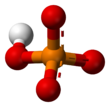Chemistry:Monohydrogen phosphate
From HandWiki

| |||
| |||
| Names | |||
|---|---|---|---|
| Preferred IUPAC name
Hydrogenphosphate | |||
| Systematic IUPAC name
Monohydrogenphosphate Phosphoric acid, ion(2-) | |||
| Other names
Phosphoric acid, ion(2-)
Hydrophosphoric acid (2-) Biphosphate (2-) | |||
| Identifiers | |||
3D model (JSmol)
|
|||
| ChEBI | |||
| ChemSpider | |||
| 1998 | |||
PubChem CID
|
|||
| UNII | |||
| |||
| |||
| Properties | |||
| HPO2−4 | |||
| Conjugate acid | Dihydrogen phosphate | ||
| Conjugate base | Phosphate | ||
Except where otherwise noted, data are given for materials in their standard state (at 25 °C [77 °F], 100 kPa). | |||
| Infobox references | |||
Hydrogen phosphate or Monohydrogen phosphate (systematic name) is the inorganic ion with the formula [HPO4]2-. Its formula can also be written as [PO3(OH)]2-. Together with dihydrogen phosphate, hydrogenphosphate occurs widely in natural systems. Their salts are used in fertilizers and in cooking.[1] Most hydrogenphosphate salts are colorless, water soluble, and nontoxic.
It is a conjugate base of phosphate [PO4]3- and a conjugate acid of dihydrogen phosphate [H2PO4]-.
It is formed when a pyrophosphate anion [P2O7]4− reacts with water H2O by hydrolysis, which can give hydrogenphosphate:
- [P2O7]4− + H2O ⇌ 2 [HPO4]2−
Acid-base equilibria
Hydrogenphosphate is an intermediate in the multistep conversion of phosphoric acid to phosphate:
| Equilibrium | Disassociation constant, pKa[2] |
|---|---|
| H3PO4 ⇌ H2PO−4 + H+ | pKa1 = 2.14[lower-alpha 1] |
| H2PO−4 ⇌ HPO2−4 + H+ | pKa2 = 7.20 |
| HPO2−4 ⇌ PO3−4 + H+ | pKa3 = 12.37 |
- ↑ Values are at 25 °C and 0 ionic strength.
Examples
- Diammonium phosphate, (NH4)2HPO4
- Disodium phosphate, Na2HPO4, with varying amounts of water of hydration
References
- ↑ Schrödter, Klaus; Bettermann, Gerhard; Staffel, Thomas; Wahl, Friedrich; Klein, Thomas; Hofmann, Thomas (2008). "Ullmann's Encyclopedia of Industrial Chemistry". Ullmann's Encyclopedia of Industrial Chemistry. Weinheim: Wiley-VCH. doi:10.1002/14356007.a19_465.pub3.
- ↑ Powell, Kipton J.; Brown, Paul L.; Byrne, Robert H.; Gajda, Tamás; Hefter, Glenn; Sjöberg, Staffan; Wanner, Hans (2005). "Chemical speciation of environmentally significant heavy metals with inorganic ligands. Part 1: The Hg2+, Cl−, OH−, CO2−3, SO2−4, and PO3−4 aqueous systems". Pure Appl. Chem. 77 (4): 739–800. doi:10.1351/pac200577040739.
 |


